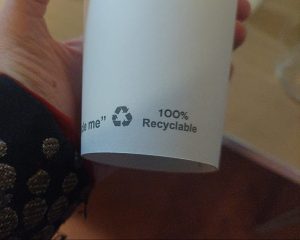19 September 2024
My name is Teodora Rinciog and I am the Sustainable Conferencing and Communications Officer at The Company of Biologists. For the past year, I have been working on improving the sustainable strategy of our charitable Workshops and Journal Meetings, whilst also supporting biologists across the world organise their academic events in a more sustainable manner. In this blog, I would like to share with you what I have learnt in the past year about how to organise sustainable academic events and how this will change in the future. While climate change is a familiar term nowadays, it is still hard to imagine how this will tangibly affect our lives in the near future. We were born in the era of consumerism, and it is difficult to imagine that our children will live any differently to us. Yet, the UN has already announced that we could reach the critical 1.5 °C global warming threshold soon. Every action taken from now on counts.
The activities of the biological community make a fundamental contribution to the progress of medical discovery and in our understanding of the natural world. It is both a challenge and an opportunity to use the creativity and innovation embedded within our community to solve the issues that climate change will pose for activities that are important in our academic lives. Compared to some industries, there is less formal research on implementing sustainable practices within academia and the event industry, but this is countered by a growing interest from biologists that are trying to minimise the environmental impact of their lab work, as well as trying to organise conferences more sustainably.
Like almost anything else in the world, the events industry is dependent on fossil fuels and there is a need to move towards greener solutions. But what are the most important things to focus on? The answer is simple: transportation, energy and plastic manufacture.
What could the events of the future look like?
Reducing the carbon footprint of academic events is essential if we are to make academia more sustainable. To reduce our reliance on fossil fuels, we will need to look at new and emerging technologies that will allow us to improve the ‘virtual’ user experience. This would mean fewer people travelling and attending events in person.
We are already seeing many companies delivering new technologies that allow people to interact with each other through augmented reality, using AI and other tools to move us away from poor graphics and avatars. It will be interesting to see how the industry develops and whether these technologies will become more widely used and accessible to the biological community in the future. Currently, as things stand, the technology is not available to compete with the in-person experience; however, we can expect the gap to close significantly over the next 10 years.
While these advanced technologies might not be available to us yet, we can still make a difference today in the way we organise our academic events with a lower environmental impact. Carbon saved today makes a bigger difference than carbon saved tomorrow, every small action that we take counts towards preventing global warming passing the threshold of 1.5°C.
Let us look at an example from one of our grant recipients earlier this year. Serena Stanga (Neuroscience Institute Cavalieri Ottolenghi, University of Turin) showed us how the best solutions might come from combining different approaches; from minimising the transportation carbon footprint by replacing flights with train journeys when possible, to providing remote access solutions to the attendees. We also learned from Chrissy Hammond (University of Bristol) about the importance of communication combined with selecting the right suppliers to support your sustainability vision. By working with sustainability-conscious suppliers with their own policies and strategies to combat climate change, the collaboration helps in decarbonising multiple key elements of events, including accommodation, venues and catering.
By working with sustainability-conscious suppliers with their own policies and strategies to combat climate change, the collaboration helps in decarbonising multiple key elements of events, including accommodation, venues and catering.
Bringing sustainability into an academic event means paying attention to the small details that every organiser has on their radar while keeping an eye on the bigger picture. Academic events intrinsically bring people together to share ideas, which means that their impact lasts longer than the event itself. Spreading awareness and inspiring others to think about sustainable practices is equally as important as putting them into action yourself. Therefore, academic events are the perfect place to spread awareness about the risks posed by climate change to people who can make a difference.
While the future of the academic event industry can still have many faces, we encourage you to decide how it should look today. Replacing plane journeys with less impactful transportation options, prioritising venues and accommodations that rely on green energy, avoiding red meat in your menus or minimising food waste can make a significant difference today.
Through our grants from the Fund for Innovations in Sustainable Conferencing, The Company of Biologists can assist you with the option to test your sustainable ideas free of the financial burden. We are always here to support your vision to create more sustainable events.
And as always, if you need any support, contact me at sustainability@biologists.com.








You must be logged in to post a comment.